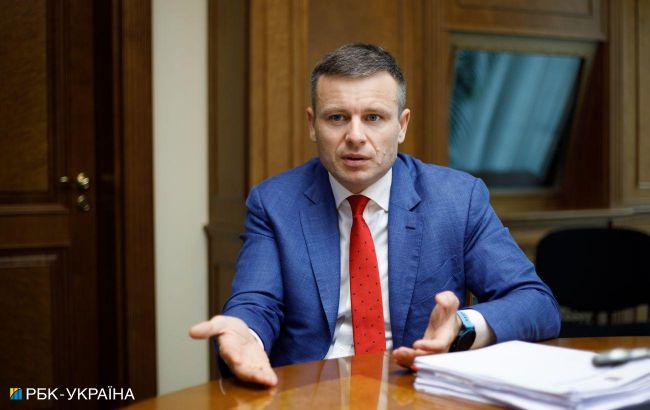Budget loses billions due to exchange rate: Is strong hryvnia hurting and what Finance Ministry wants
 Photo: Serhii Marchenko (Vitalii Nosach/RBC-Ukraine)
Photo: Serhii Marchenko (Vitalii Nosach/RBC-Ukraine)
Due to the fixed exchange rate of the hryvnia, the budget doesn't have enough money to cover expenses. Only through a reduction in customs payments will the treasury lose several tens of billions of dollars this year. Why a stable exchange rate harms the budget read in the material by RBС-Ukraine.
The Ministry of Finance of Ukraine is concerned that due to the overvalued exchange rate of the hryvnia to the dollar, the budget is not receiving sufficient funds. If the exchange rate policy does not change, the same situation will persist next year.
"We are worried about the strengthening of the hryvnia... Next year, we expect an exchange rate of 41.4 UAH per dollar," said Finance Minister Serhii Marchenko in a meeting with business representatives.
The official exchange rate in 2023 remains unchanged – it has been fixed at 36.57 UAH per dollar since the previous year. However, the budget was calculated based on a higher exchange rate – the annual average was expected to be 42.2 UAH per dollar, and by the end of the year, it was projected to reach 45.8 UAH per dollar.
During the budget preparation, the Ministry of Finance relies on forecasts from the Ministry of Economic Development and other authorized structures, as mentioned by Marchenko. In this case, the National Bank is one of the sources of data used to estimate the state budget.
At the end of the previous year, when the budget was being prepared, almost no one had doubts that the exchange rate would weaken over the course of the year. "If you look at the exchange rate forecasts when the budget for 2023 was adopted, everyone was convinced that the hryvnia would devalue. There were various forecasts – not all as pessimistic as in the Ministry of Finance, but it was a common expectation in the market," noted Vitalii Vavryshchuk, head of the macroeconomic research department at ICU Group, in a comment to RBC-Ukraine.
Business also expected and continues to expect an increase in the exchange rate. According to the European Business Association (EBA), companies project an average exchange rate of 41 UAH per dollar for the next year, while the forecast for the current year was 43 UAH per dollar.
However, forecasts do not always come true. When it comes to the budget, exchange rate expectations often do not align with the real situation. The exchange rate issue has been a subject of discussion between the National Bank and the Ministry of Finance for quite some time. In recent years, the actual and, accordingly, the average annual exchange rate has usually been slightly lower than the projected rate. The Ministry of Finance is interested in a higher exchange rate to increase the budget's ability to cover the country's maximum needs.
But in 2023, the difference turned out to be quite significant – nearly 6 billion hryvnias, which is approximately 15%. Naturally, the Ministry of Finance faced serious challenges in compensating for the budget shortfall, which is mostly allocated to ensure the country's combat readiness.
Budget losses due to the low exchange rate
The plan for budget revenues from taxation is currently being exceeded. This is happening, in particular, because of the return of certain fees, including those from automotive fuel. "We are currently exceeding the plan despite the exchange rate, but it's very challenging," said Danylo Hetmantsev, the head of the financial committee of the Verkhovna Rada, in a comment to RBC-Ukraine. He shares the concerns of the Ministry of Finance about a decrease in budget revenues due to the high exchange rate.
However, there is a significant shortfall at the customs office. At the end of the year, customs revenues are expected to be tens of billions of hryvnias less than planned. These are approximate figures, and exact numbers are not currently specified. The situation is explained by the fact that imports significantly exceed exports.
Official data on foreign trade are not disclosed, but the figures for the first quarter of 2023 show a significant increase in imports alongside a decrease in exports - imports grew by 20.7%, while exports decreased by 14.3%. This trend continues at present. Marchenko confirmed that exports are not growing at all, while the situation with imports is the opposite.
Furthermore, the high exchange rate, which, in Marchenko's view, lacks any fundamental reasons, reduces both grants and credit inflows to the budget. These funds are supposed to replenish the budget deficit and should be exchanged into hryvnias.
"Of course, with a lower exchange rate, the amounts of money for the budget in hryvnias are lower. And, of course, the Ministry of Finance is concerned that the hryvnia equivalent of loans and grants is significantly smaller than the sums budgeted for. Moreover, due to the fixed exchange rate, taxes on imports are not rising as quickly as desired," said Vavryshchuk.
Where to get the money?
The main sources for increasing the budget can be external and internal borrowings. To increase external borrowings, changes to the budget are necessary. To increase internal borrowings (placement of domestic government bonds, or OVDP), there is no need to change the budget. However, the placement of OVDP due to the National Bank of Ukraine's high policy rate of 22% is relatively expensive - currently, the yield on annual papers is 18-19%. However, the NBU has started gradually reducing the policy rate because inflation is decreasing at a faster pace than expected. Vavryshchuk does not rule out that the policy rate will be lowered soon, causing the cost of OVDP to decrease by 1.5-2 percentage points.
However, perhaps the NBU will soon transition to a flexible exchange rate, which could partially solve the issue of increasing budget revenues.
If the transition happens closer to the end of the year, the effect on annual inflation will be minimal. Additionally, the increase in budget revenues this year will also be insignificant. Moreover, the National Bank does not plan to let the hryvnia float freely but will maintain it within certain limits. There will be no sharp devaluation, according to Vavryshchuk. "Perhaps we should expect a gradual weakening of the hryvnia throughout the year (in 2024), and it is clear that the exchange rate at the end of the year will be higher than the average," the expert noted.
But even if a flexible exchange rate is introduced soon, it will not save the budget, as the portion of revenues dependent on the exchange rate is relatively small, believes Oleksandr Parashchii, the head of the analytical department at Concorde Capital. He is convinced that this year the budget is more affected by relatively low inflation and the NBU's inflation-fighting policies.
"The National Bank is hitting the Ministry of Finance twice: with a high policy rate, which leads to expensive domestic borrowing, and with low inflation, which reduces budget revenues," he said in a comment to RBC-Ukraine.
According to Parashchii, predicting the situation is currently quite challenging since there is no complete understanding of the volumes and schedule of international assistance. In such conditions, allowing for significant exchange rate fluctuations is quite risky.
The uncertainty regarding funding from the United States for the fourth quarter, as reported by RBC-Ukraine in late August, still persists. This was essentially confirmed by Ukraine's Ambassador to the United States, Oksana Markarova. According to her, getting support from the U.S. Congress on this matter, which Congress will begin considering after September 12, will be "very challenging."

